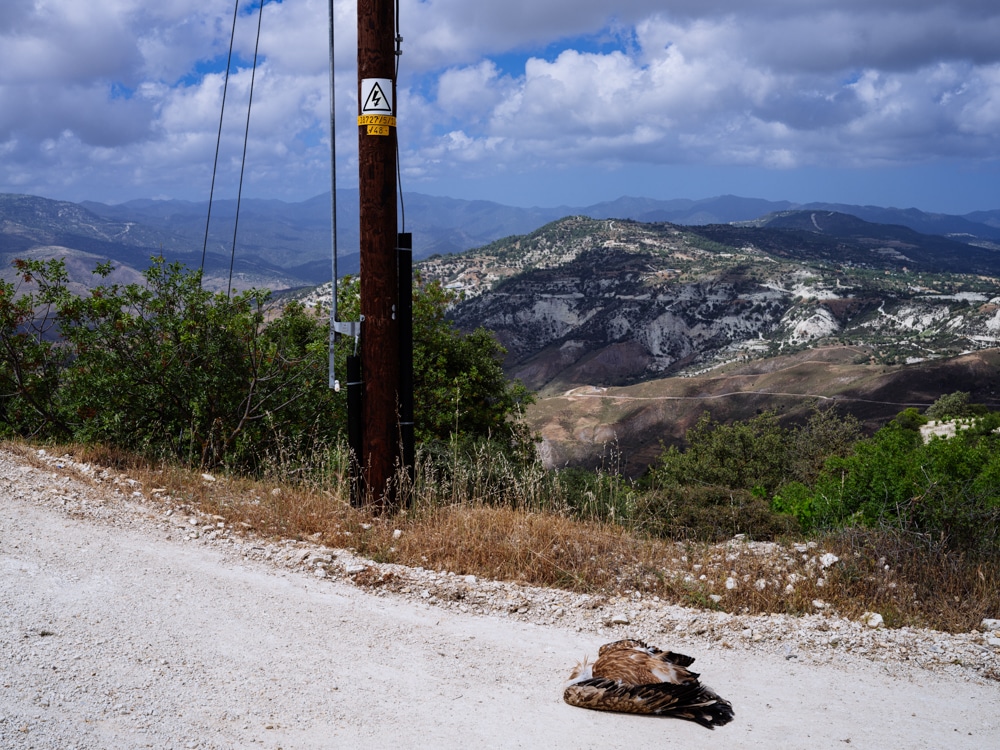Two more vultures have been killed by electrocution along the EAC network “despite the appeals and warnings of the experts”, BirdLife Cyprus said on Friday calling the electricity provider a “serial killer of vultures”.
In a joint statement the NGO, the Game and Wildlife Service, Terra Cypria and the Vulture Conservation Foundation said that last Saturday, two Griffon vultures (Gyps fulvus) died from electrocution on EAC poles on the Medium Voltage overhead network that feed Cyta’s antenna in the area between Kelokedara and Salamiou in Paphos.
“In April 2022, in the exact same spot, another vulture died of electrocution, while in the same area in 2018, a vulture died after hitting an overhead line,” the joint announcement said.
“These poles at the core of the vulture’s territory are a death trap for this critically endangered and protected species, and the two recent deaths amount to massive ecological damage,” it added.
The organisations suggested that underground insulated cables, insulating poles or using a safe type of poles that prevent electrocution of birds were simple measures taken in many European and other countries that allow the electricity grid to coexist with wildlife.
The statement said it was “particularly disappointing” that these deaths could have been avoided if the EAC had implemented remedial measures at the site when it was informed of the dangers after the death of the first vulture in 2022.
Although the EAC has shown a willingness to insulate of the stakes and although for four years there has been funding available to the EAC from the Game and Wildlife Service through a European programme, the project was never carried out.
The groups said that since vultures often pass by the particular spot and use the poles for resting, it was only a matter of time before more died from electrocution.
They added that the two deaths represent a significant loss for the very small vulture population, which now numbers 27 at a time when significant European and national resources were being spent on the recovery of the species.
Other birds are also affected such as the Spear Eagle (Aquila fasciata) the statement said. In addition, several other species have been found dead from impact or electrocution such as Cranes, Petrels, Eleonora’s Falcons, Aetogerakines and smaller species.
“Data from satellite transmitters embedded in birds show that impact with overhead power lines and electrocution are the second leading cause of mortality for the vultures and third for the eagles,” it added.
Pesticides and poisoning are also responsible for bird deaths.
In the space of two years, five vultures have died due to electrocution and since 2018 nine eagles have died due to impact and/or electrocution.
BirdLife said these numbers were most likely an underestimation of the true levels of mortality from these causes as not all birds carry satellite transmitters and dead birds are not always found.
It said that well-designed electricity transmission and distribution networks play a key role in safeguarding bird species and Natura 2000 protected areas by preventing mortality and fires from electrocution incidents.
It added that mitigation of impacts on Natura 2000 areas and protected species from EAC infrastructure is the responsibility of the EAC, based on the provisions of the Protection and Management of Wild Birds and Game Acts 2003 to 2020. Therefore, the design of poles and crossing lines should take this into account.
The Game and Fauna Service and BirdLife Cyprus, as the implementing bodies of special programmes, have secured significant funding of €150,000 from national, private and European resources that facilitate the EAC’s implementation of mitigation measures such as marking overhead power lines to avoid collisions and insulating pylons and poles to avoid electrocution.
“However, these measures have not only not been fully implemented yet, but on the contrary, there is a long delay in their implementation,” the statement said.
“The situation must be dealt with immediately and the EAC, on the advice of the Game and Wildlife Service, should act immediately to insulate all the poles that have been identified as high risk for vultures and eagles.”
According to data, between 1996 and 2023, 70 vulture deaths were recorded. Of these 56 were due to poisoning, four due to collision and electrocution with electricity cables, four from an unknown cause, three due to gunshots, two due to lead poisoning and one due to disorientation and exhaustion.







Click here to change your cookie preferences